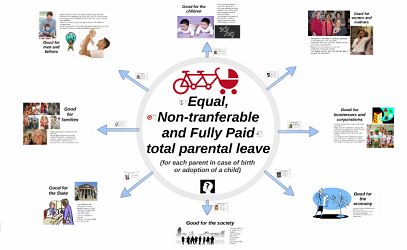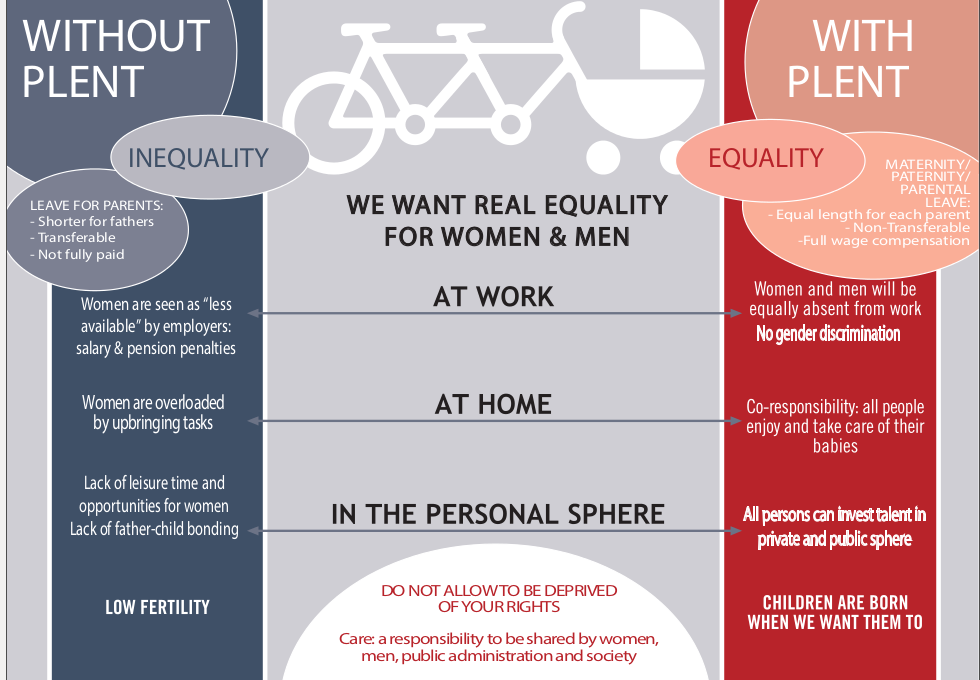– Virtually all national governments and European authorities recognize that equal use of parental leave by men and women would be a pre-condition for gender equality. First, it is absolutely necessary that women and men leave their jobs for the same period if we want to achieve equal pay and equal social benefits. Second, men will never share care equally if they are not in charge of their babies on their own for the same time as mothers.
– However, and this is the crucial question: are leave policies actually designed in such a way that this goal is attainable? Definitely they are not. Three features of leave regulations combine themselves to make women take the largest proportion of the total number of leave days: 1) maternity leave longer than paternity leave; 2) transferable leave; and 3) poorly paid leave. These three elements present different weights in each country leave design, but they invariably produce the same effect: they reinforce inequality and don’t appeal to a significant number of fathers.
– Empirical evidence overwhelmingly shows that the majority of men take leave only if it is non-transferable and fully replaces his salary. This is the “golden rule” of parental leave policy and it works in the same direction in all countries.
– The conclusion is straight forward: an equal in duration, non-transferable and fully paid leave for each parent would be the right regulation in order to attain equal uptake of leave by mothers and fathers (the PLENT reform)
It is difficult to deny that the actual parental leave systems fail to assure basic social rights while sustain and reinforce the obsolete idea that women are primarily responsible for childcare. How is it, then, that the obvious reform for equal, non-transferable and fully-paid parental leave has not been performed in any country yet? How can governments declare to be for equal pay or for economic independence of women and, at the same time, maintain systems which promote mothers to leave their jobs for longer than fathers, in many cases losing most of their income?
Today, after so many years of governments’ statements in favor of women’s rights, it is high time to denounce the inconsistency between discourses and actions. The PLENT reform is cheap, cost-effective and highly feasible (just by passing a law in Parliament). In connection with universal public childcare and other policies, this reform would make a big stride towards the individual earner/carer gender regime.
The experience allows us to maintain that the PLENT reform would be widely supported by the population. In some countries, where the system results in most mothers taking a short leave (less than half a year, as in Iceland or in Spain), extending this right to the father appears as a great idea to most people. The difficulties arise when governments have to take action.
In Scandinavian countries, long transferable leaves have resulted in most mothers staying on leave for more than a year. Granting the father (or the other parent) the same long leave would make a total parental leave of more than two years, which would be difficult to justify in terms of children and social needs. Therefore, the reasonable way to achieve equal take up by men and women in these countries would be the complete individualization of the leave. However, the governments argue that individualization can be regarded by a part of the population as “depriving women from their leave” and that it would be against “family choice”.
This is the negative impact of transferable leave: it has originated a problem of “path dependency”. Ironically, the most advanced countries in gender equality still struggle with this very important matter[1]. But in fact the daddy months have been well received in all countries, and demands of total individualization arise everywhere. Instead of barricading themselves behind patriarchal inertias, governments should favor the public debate, explain the negatives consequences of inequality in all areas and assure effective conditions for equality.
The debate about parental leave systems has a high heuristic power, as it helps to clarify the real orientation and assumptions of governments about gender roles and gender regimes. Equal, non-transferable and fully paid parental leave is not just another reform; it is emblematic of a crucial turning point towards gender equality that is yet to come.
[1] Iceland experience confirms this evidence: the parental leave reform of the year 2000 granted the father 3 months of non-transferable and well paid leave, another three months for the mother and three transferable months. The fact that women had only 6 months before made it easier to grant fathers three months, as those months where additional to the previous total duration. So in Iceland most mothers continue to take 6 months, and most fathers now take their non-transferable 3 months. In 2013 a new reform was passed (and now blocked by the new Government), by which the total duration should be extended to 12 months: 5 non-transferable months for each parent and 2 transferable months. A wasted occasion to achieve a real egalitarian parental leave system with 6 months for each parent but nevertheless the farthest any country has arrived, as this new system would result in mothers taking 7 months and fathers taking 5 months.
[1] Iceland experience confirms this evidence: the parental leave reform of the year 2000 granted the father 3 months of non-transferable and well paid leave, another three months for the mother and three transferable months. The fact that women had only 6 months before made it easier to grant fathers three months, as those months where additional to the previous total duration. So in Iceland most mothers continue to take 6 months, and most fathers now take their non-transferable 3 months. In 2013 a new reform was passed (and now blocked by the new Government), by which the total duration should be extended to 12 months: 5 non-transferable months for each parent and 2 transferable months. A wasted occasion to achieve a real egalitarian parental leave system with 6 months for each parent but nevertheless the farthest any country has arrived, as this new system would result in mothers taking 7 months and fathers taking 5 months.






